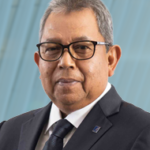
Financial Planning, Fintech Synergy Key to Malaysia Economic Resilience, Says SC
by Rebecca Oi September 13, 2023The world of finance, like many industries, is undergoing rapid transformation, spurred mainly by technological advancements even in emerging markets.
One such country embracing this transformation is Malaysia, which was the backdrop for insights shared at the Financial Planning Association of Malaysia (FPAM) Annual Signature Financial Planning Symposium 2023 by Dato’ Seri Dr. Awang Adek Hussin, Chairman of the Securities Commission Malaysia.
A glimpse into Malaysia’s economic resilience
In the wake of a global pandemic, the economic tenacity of nations was truly tested. Malaysia’s resilience was evident in its post-pandemic recovery, achieving a year-on-year GDP growth of 4.2 percent in the first half of 2023.
In a world where economies struggled to find footing, Malaysia regained its pre-pandemic stature and exceeded its 2019 real GDP by over 6 percent.

Dato’ Seri Dr. Awang Adek Hussin, Dato’ Seri Dr. Awang Adek Hussin, Chairman of the Securities Commission Malaysia
Various factors, including global monetary conditions, corporate earnings, and the ever-evolving geopolitical landscape, partly influenced the resilient performance of Malaysia’s capital market.
Dato’ Seri Dr. Awang highlighted that the launch of the MADANI economic framework served as a beacon of clarity. It signified Malaysia’s proactive approach to identifying and rectifying structural economic challenges.
A holistic approach, MADANI sought to establish a sustainable growth path, ensuring a fair distribution of economic opportunities across all societal levels.
The surge in financial planning
Financial planning in Malaysia isn’t a nascent industry; it’s been a cornerstone of the nation’s financial infrastructure. Yet, the past decade has witnessed an explosive growth. From 2015 to 2022, there was a 42 percent rise in financial planning firms.
This growth wasn’t limited to establishments but extended to human resources. Licensed representatives, the foot soldiers of this industry, saw their numbers rise by a whopping 145 percent during the same period.
This rise wasn’t accidental. Organisations like FPAM have been instrumental in shaping this trajectory. The introduction of tools and platforms like the SmartFinance portal provided the necessary scaffolding.
Coupled with enhanced professional standards and innovative financial planning software, the sector witnessed a synthesis of traditional financial practices with modern technological solutions.
Sustainable investments are the new norm
A pivotal shift in investments has been the inclination towards sustainability. No longer confined to environmentalists or activists, the drive towards Sustainable and Responsible Investment (SRI) has permeated mainstream financial thinking.
Dato’ Seri Dr. Awang succinctly captured this sentiment when he touched upon the keenness of the younger generation to ensure their investments not only yield monetary returns but also contribute to societal and environmental welfare.
This trend has introduced a plethora of investment avenues, from transitioning towards clean energy to understanding the dynamics of waqf-featured funds, which harmoniously blend commercial, social, and religious objectives.
The digital imperative
In an era of digital transformation, staying relevant means embracing technological innovations, and Malaysia has quickly recognised this.

Digital Transformation in Malaysia
The introduction of the Digital Innovation Fund, or DIGID, in 2022 underscored the nation’s commitment to infusing technology into its financial fabric.
While more prominent players in the capital market were swift to embark on their digital journeys, smaller entities found the terrain challenging.
DIGID was conceived to bridge this gap. By co-funding projects that showcase technology’s potential to create novel solutions for the Malaysian capital market, DIGID seeks to democratise digital innovation.
Two initiatives under this fund stand out. An AI-enabled app aims to demystify financial planning, offering personalised insights to Malaysians and helping them chart their economic destinies.
Meanwhile, a data-driven customer relationship management system seeks to revolutionise client interactions, using analytics to predict and cater to client needs.
Recently, the Securities Commission Malaysia announced the first batch of three award recipients for DIGID.
These comprise MULA Advisory, focusing on financial well-being for Malaysians; Capsphere Services, a P2P platform bridging the gap between Malaysian SMEs and potential investors; and Advisonomics, which combines technology and personal engagement to address financial planning needs.
Cultivating tomorrow’s talent today
A continuous influx of fresh talent is paramount for any industry to thrive. Recognising this, initiatives like InvestED have been launched. This graduate program, designed by the SC, offers theoretical knowledge and practical exposure, equipping the next generation with the necessary skills.
Moreover, outreach programs like the Financial Planning Day serve as recruitment platforms and play a pivotal role in investor education, especially among the youth.
These initiatives are shaping a financially literate populace by familiarising them with the nuances of financial planning and educating them on the potential pitfalls, such as scams.
The dawn of family offices
A relatively newer concept in Malaysia’s financial landscape is the family office. Recent announcements from the nation’s Prime Minister have indicated efforts to make Malaysia an attractive destination for establishing these entities.
These family offices, which manage the wealth and affairs of affluent families, offer a myriad of services, from traditional investments to intricate services like estate planning.
For licensed financial planners, this presents an untapped reservoir of opportunities. As Malaysia continues its drive to attract these establishments, financial planners find themselves at the cusp of a new service era, offering bespoke solutions to cater to a clientele with diverse and complex needs.
Looking ahead
Change, they say, is the only constant. This couldn’t be truer in the fast-evolving world of finance, particularly amidst the digital transformation sweeping through Malaysia. Yet, as Dato’ Seri Dr. Awang pointed out, adaptability remains key.
“The financial landscape is in perpetual motion, driven by evolving technologies and changing investor preferences. To thrive, one must anticipate, adapt, and evolve,” said Dato’ Seri Dr. Awang.
The synergy between financial planning and fintech isn’t a transient phase but a harbinger of things to come.
For those willing to embrace change, stay nimble, and continuously learn, the future promises untapped potential and unprecedented opportunities.
By fostering innovation, upskilling the workforce, and continually adapting to the changing landscape, Malaysia’s financial planning sector is poised for a bright and prosperous future.








